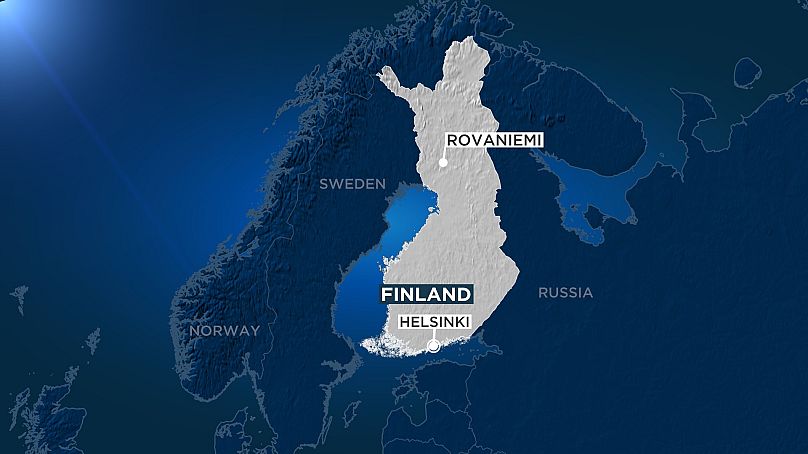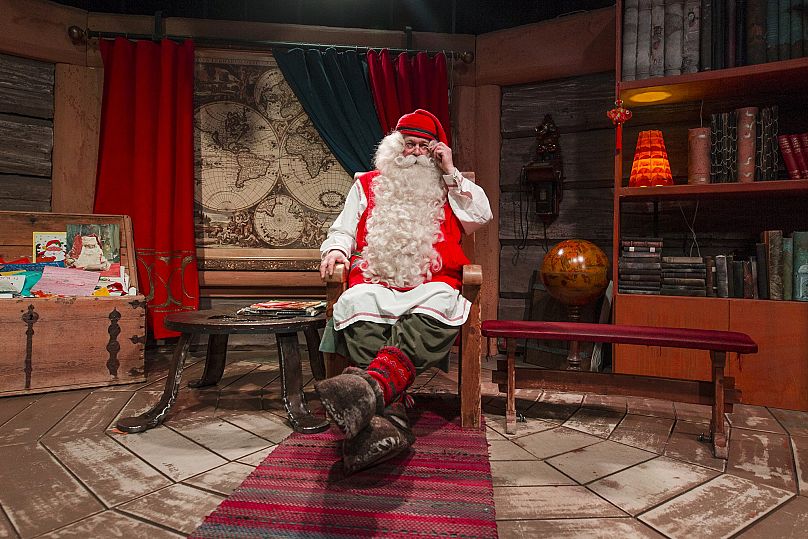Last year’s COVID travel restrictions and lockdowns saw tourist numbers from outside Finland slump by 98% compared with the previous 12 months.
The daytime temperatures have dropped down to -12°C and there’s snow on the streets of Rovaniemi, the capital of Finnish Lapland.
 ADVERTISEMENT
ADVERTISEMENT
 ADVERTISEMENT
ADVERTISEMENT
The fairy lights are twinkling, the hotel staff are back at their posts, restaurant kitchens prepped, and snowmobiles ready for action.
What they’re waiting on now is for the tourists to arrive.
This part of Finland relies heavily on seasonal visitors during winter, and particularly in the weeks before Christmas when more than a dozen charter flights a day can land at the town’s small Arctic Circle airport, bringing sightseers from across Europe for winter wonderland day trips.
Last year’s COVID pandemic travel restrictions and lockdowns decimated the economy here, with tourist numbers from outside Finland slumping by 98% compared with the year before.
Now, with a surge in coronavirus infections across Europe, there are concerns about whether it could impact the local economy this year as well.
But there’s also cautious optimism.
“It’s looking positive at the moment, but of course there are the threats and the worries in Europe,” says Sanna Kärkkäinen, managing director of the Visit Rovaniemi tourist promotion board.
“There is a big possibility that something will happen of course with the European market, like we keep hearing now from Austria and Germany, and also other countries with rising infection numbers that have the possibility of having further restrictions.
“That might hit our winter season or even the Christmas season. There are a lot of question marks.”
Tourism chiefs and business owners alike fear that if there is any further delay in the road to recovery, companies that managed to survive during the pandemic wouldn’t last a second year in a row without international tourists.
Still, the estimate for this year is that inbound tourism numbers will reach 70% of 2019’s pre-pandemic figures which were already a record high, with the main markets for charter flights to Rovaniemi -- in Germany, Netherlands and the UK -- looking healthy at this point.
And the most recent projections point to Lapland recovering fully from the pandemic in terms of its tourism economy by 2023, a year ahead of the first projections done in spring.
Business owners watching Europe’s covid numbers carefully
For many local businesses that rely so heavily on winter holidaymakers, winter 2021/22 will be a make or break season.
Lapland Safaris caters to the outdoor adventure market, an increasingly important sector within the travel industry. There’s husky and reindeer sledge rides, ice fishing, and snowmobile safaris on offer, as well as cultural and culinary experiences, and sky-gazing under the spectacular Northern Lights.
“We are much more hopeful at the moment, the demand seems to be there and we are receiving bookings, and the tour operators are receiving bookings quite nicely,” says Rami Korhonen, Lapland Safari’s chief operating officer.
There’s been strong interest from the UK, their biggest market, but also from Benelux countries, France, Spain, Italy and Germany - even as coronavirus numbers grow and new restrictions are being put in place in some areas.
“Of course it’s a concern if there’s a total lockdown. It means people can’t travel even if they are fully vaccinated, and then it’s a big hit for us. Hopefully, fully vaccinated people can travel this winter, it’s really crucial for us.
“We lost 95% of the business last season and basically the last 20 months has been like that. If we lose this season, I think we will pretty much lose the whole business in Lapland, so we have to get some customers.”
One bright spot has been the domestic tourism market which grew by 13% in December 2020 as Finns, unable to jet off for winter sunshine or skiing in the Alps, headed north to discover the holiday options in their own country. And direct international flight connections to Rovaniemi from London, Paris, Dusseldorf, Milan and Istanbul are set to open up more opportunities for growth.
The new normal for Christmas tourists
Traditionally in the run-up to Christmas, it’s families that have flocked to Rovaniemi from all over Europe - with peak times coming as school holidays begin.
The thrill of meeting Santa Claus is clearly the main draw of a visit to Lapland, and children of all ages can meet him at two sites: the original Santa Claus Village with its wooden cabins and a post office run by elves, established in the 1980s; and the newer SantaPark in an underground cavern with fresh baked gingerbread cookies, a little train ride, and yet more elves.
Because of the pandemic, however, there’s no chance for children to sit on Santa’s lap this year.
“It’s a serious question! Santa belongs to a high-risk group because of his age,” explains Visit Rovaniemi’s Sanna Kärkkäinen.
“He’s fully vaccinated of course, and he’s sitting behind plexiglass and everyone is wearing a mask.”
Children will have to sit on a bench to ensure social distancing, and cameras are angled so that official pictures don’t show the plexiglass between the kids and Santa.
“The moment is of course very magical anyway.”
**Every weekday at 19h CET, Uncovering Europe brings you a European story that goes beyond the headlines. Download the Euronews app to get a daily alert for this and other breaking news notifications. It's available on Apple and Android devices.
**












